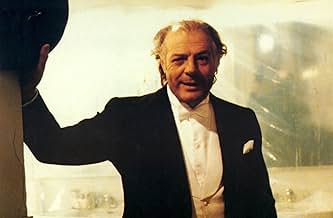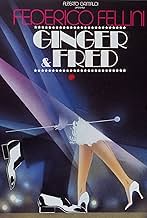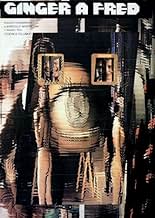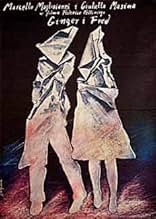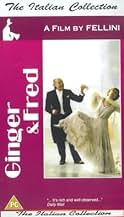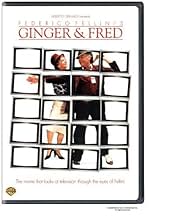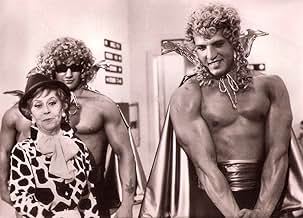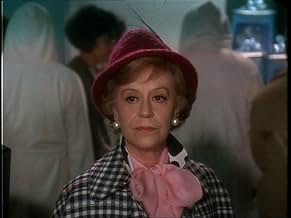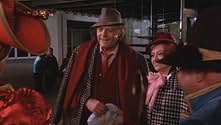IMDb-BEWERTUNG
7,2/10
5771
IHRE BEWERTUNG
Füge eine Handlung in deiner Sprache hinzuAmelia and Pippo are reunited after several decades to perform their old music-hall act on a TV variety show.Amelia and Pippo are reunited after several decades to perform their old music-hall act on a TV variety show.Amelia and Pippo are reunited after several decades to perform their old music-hall act on a TV variety show.
- Nominiert für 1 BAFTA Award
- 18 Gewinne & 18 Nominierungen insgesamt
Friedrich von Ledebur
- Admiral Aulenti
- (as Frederick Ledebur)
Jacques Henri Lartigue
- Brother Gerolamo
- (as Jacques Henry Lartigue)
Totò Mignone
- Totò
- (as Toto Mignone)
Antoine Saint-John
- Bandaged man
- (as Antoine Saint Jean)
Friedrich von Thun
- Kidnapped Industrialist
- (as Frederich Thun)
Antonino Iuorio
- Production Inspector
- (as Antonio Iuorio)
Empfohlene Bewertungen
I think this is the last great Federico Fellini picture. Maybe it's not as classic as "I vitelloni", "La strada", "Le notti di Cabiria", "La dolce vita", "Otto e mezzo" and "Amarcord", but it's a return to a more comedy style and it's one of the most accessible works of the Maestro as well.
"Ginger e Fred" (1985) comes after a series of more experimental films from Fellini. In this satirical comedy about TV power, a couple of old dancers reunite for a Christmas show. They enter a world where everything is taken for making audience, the two and their art are just caricatures... But who cares? The only important thing is audience.
In this feature Fellini warns about TV dangers -in a very sarcastic way he anticipates what TV is today with all these Reality shows.
The film is a typical Fellini picture -the story has not a real plot, it's a voyage where strange people (also in a physical way!) meet, we always can find exaggerated and ambiguous situations...
At the same time there's a lot of tenderness between the two dancers, superbly played by Marcello Mastroianni (who starred in several Fellini works) and Giulietta Masina (the actual Fellini's wife). It's useless to say that the chemistry between the two main actors is rally great.
It's quite a nostalgic movie -it seems that Fellini looks back and thinks about a world in which fantasy and creativity could be expressed in a better way, whereas TV kills everything.
The two subsequent films of the Italian director ("Intervista" and "La voce della luna") are rather minor -although poetic they're not as fresh and simple as "Ginger e Fred".
We miss Federico, Giulietta and Marcello.
"Ginger e Fred" (1985) comes after a series of more experimental films from Fellini. In this satirical comedy about TV power, a couple of old dancers reunite for a Christmas show. They enter a world where everything is taken for making audience, the two and their art are just caricatures... But who cares? The only important thing is audience.
In this feature Fellini warns about TV dangers -in a very sarcastic way he anticipates what TV is today with all these Reality shows.
The film is a typical Fellini picture -the story has not a real plot, it's a voyage where strange people (also in a physical way!) meet, we always can find exaggerated and ambiguous situations...
At the same time there's a lot of tenderness between the two dancers, superbly played by Marcello Mastroianni (who starred in several Fellini works) and Giulietta Masina (the actual Fellini's wife). It's useless to say that the chemistry between the two main actors is rally great.
It's quite a nostalgic movie -it seems that Fellini looks back and thinks about a world in which fantasy and creativity could be expressed in a better way, whereas TV kills everything.
The two subsequent films of the Italian director ("Intervista" and "La voce della luna") are rather minor -although poetic they're not as fresh and simple as "Ginger e Fred".
We miss Federico, Giulietta and Marcello.
Federico Fellini is one of the greatest directors and screenwriters the world has ever seen...and that must be the biggest understatement of the century. He had the ability to take simple, real elements and transform them into a surreal, enchanting experience that speaks for itself without the aid of a complicated plot or a multi-million dollar production design (although that's not to say his films aren't visually breath-taking). Even though it's not one of his greatest masterpieces, "Ginger e Fred" is one such film that demonstrates his never-ending talent.
The main plot is as simple as it gets. Amelia and Pippo (Giulietta Masina and Marcello Mastroianni) are old friends who haven't seen each other for years, and in their youth, they were reasonably famous for their imitation of Ginger Rogers and Fred Astaire, doing their classic tap dancing and glamorous choreographies. Now, they're very old, but they're being invited by a big (and sleazy) TV station to perform in their epic Christmas program reenacting their age-old act. The film is about these two old people, seeing each other after so many years, and remembering those golden years when they were celebrated, important, and had the spark of love and friendship alive for each other.
They're not the only ones invited to the show, though. A huge cast of quirky and colourful characters also make their appearance, each one trying to grab their share of the spotlight performing sometimes interesting, sometimes plain stupid, acts and/or abilities and "amazing" stories. We see an (obviously) Fellini-esquire array of supporting freaks- the priest who renounced his vows to marry his lover, the monk who levitates, the singing slovenly dwarfs, Swedish townsfolk with their fifteen-tit cow, a transsexual who services an entire prison row and is being processed for it, a medium who listens to ghosts through a tape recorder...the list is endless. They all have odious, over-familiar dialogue which makes us relate to the grotesque things we think well of in life. Our heroes, Amelia and Pippo, are thrown in with this collection of freaks, and find themselves both hating and liking the situation they've accepted.
The images the film presents are as unusual and as surreal as we have come to experience through other Fellini films. The dialogue sounds casual and witty, but is continually spiked with longing, electricity, loathing and disenchantment. Our main characters speak and travel this (seemingly) alternate world they've entered and find it horrifyingly equal to that they live in. The way they all try to hog the spotlight, their unnatural addiction to TV and celebrities, the way they're all brainwashed through the televised images...Fellini makes a point on all of these. He also continually presents TV commercials about pork and meat, each commercial bearing a scantly-clad woman with a gruesome piece of meat and proclaiming it to be utterly delicious. The people believe it. We also see various posters and written advertisements with strange and slightly disturbing images for a variety of products that don't work, and proclaiming nothing but lies. People believe them.
We see two main characters, Amelia and Pippo, being likable characters trying to relive their friendship, trying to regain their previous vitality and trying to fit in with a series of "freaks" (in every sense of the word) in a world where greed, money, fame and awful manners have been allowed to run rampant. We see our main characters trying to quit their association with this distasteful universe only to be drawn in over and over again by a faint memory of fame, by an interlude with someone famous, by the expectations their friends have of them.
We, as the audience, feel happy to relate to these old friends who have met once again, and feel their angst. We also feel a certain repugnant hate for the rest of the characters, unfeeling beasts who (to our surprise and chagrin) also seem, each in their own way, very similar to us and the people that surround us. And what is all the more interesting is the way Fellini never even delves into the personalities of these characters (with the exception of Amelia and Pippo) but indirectly spends every second of the film injecting meaning and objection into them. The images, of course, speak for themselves.
Masina and Mastroianni are perfect in their roles, the music is both catchy and nostalgic, the costumes are...well, out of this world and the screenplay is both earthbound and ethereal. I couldn't understand the emotional implications of the ending, but I suppose that must be Fellini's point, to leave the audience thinking. And, believe me, this movie does get you thinking! And though it's definitely not one of Fellini's greatest, it still is entertaining and amusing to analyze.
Rating: 3 stars and a half out of 4!
The main plot is as simple as it gets. Amelia and Pippo (Giulietta Masina and Marcello Mastroianni) are old friends who haven't seen each other for years, and in their youth, they were reasonably famous for their imitation of Ginger Rogers and Fred Astaire, doing their classic tap dancing and glamorous choreographies. Now, they're very old, but they're being invited by a big (and sleazy) TV station to perform in their epic Christmas program reenacting their age-old act. The film is about these two old people, seeing each other after so many years, and remembering those golden years when they were celebrated, important, and had the spark of love and friendship alive for each other.
They're not the only ones invited to the show, though. A huge cast of quirky and colourful characters also make their appearance, each one trying to grab their share of the spotlight performing sometimes interesting, sometimes plain stupid, acts and/or abilities and "amazing" stories. We see an (obviously) Fellini-esquire array of supporting freaks- the priest who renounced his vows to marry his lover, the monk who levitates, the singing slovenly dwarfs, Swedish townsfolk with their fifteen-tit cow, a transsexual who services an entire prison row and is being processed for it, a medium who listens to ghosts through a tape recorder...the list is endless. They all have odious, over-familiar dialogue which makes us relate to the grotesque things we think well of in life. Our heroes, Amelia and Pippo, are thrown in with this collection of freaks, and find themselves both hating and liking the situation they've accepted.
The images the film presents are as unusual and as surreal as we have come to experience through other Fellini films. The dialogue sounds casual and witty, but is continually spiked with longing, electricity, loathing and disenchantment. Our main characters speak and travel this (seemingly) alternate world they've entered and find it horrifyingly equal to that they live in. The way they all try to hog the spotlight, their unnatural addiction to TV and celebrities, the way they're all brainwashed through the televised images...Fellini makes a point on all of these. He also continually presents TV commercials about pork and meat, each commercial bearing a scantly-clad woman with a gruesome piece of meat and proclaiming it to be utterly delicious. The people believe it. We also see various posters and written advertisements with strange and slightly disturbing images for a variety of products that don't work, and proclaiming nothing but lies. People believe them.
We see two main characters, Amelia and Pippo, being likable characters trying to relive their friendship, trying to regain their previous vitality and trying to fit in with a series of "freaks" (in every sense of the word) in a world where greed, money, fame and awful manners have been allowed to run rampant. We see our main characters trying to quit their association with this distasteful universe only to be drawn in over and over again by a faint memory of fame, by an interlude with someone famous, by the expectations their friends have of them.
We, as the audience, feel happy to relate to these old friends who have met once again, and feel their angst. We also feel a certain repugnant hate for the rest of the characters, unfeeling beasts who (to our surprise and chagrin) also seem, each in their own way, very similar to us and the people that surround us. And what is all the more interesting is the way Fellini never even delves into the personalities of these characters (with the exception of Amelia and Pippo) but indirectly spends every second of the film injecting meaning and objection into them. The images, of course, speak for themselves.
Masina and Mastroianni are perfect in their roles, the music is both catchy and nostalgic, the costumes are...well, out of this world and the screenplay is both earthbound and ethereal. I couldn't understand the emotional implications of the ending, but I suppose that must be Fellini's point, to leave the audience thinking. And, believe me, this movie does get you thinking! And though it's definitely not one of Fellini's greatest, it still is entertaining and amusing to analyze.
Rating: 3 stars and a half out of 4!
Ginger e Fred (1986) is one of the few movies (4 in all) Fellini made in the '80s,and the ripest fruit of his late career,the acme of his narrative cinema.(In the 7th decade of the 20th century,Fellini also made relatively few films:only 4,and also 2 sketches.)Is "Ginger ..." Fellini's best movie?I don't know that;but it certainly is the one that I cherish most.Exquisite, unobjectionable, unparalleled cinema? Surely!Within the Fellini criteria,this is a rather simple movie,deprived of experiments,etc.;it is,of course,of no avail to be "told",but not because it lacks a "story",only that it is a simple,uneventful one.A sudden return to what we may call a perennial realism,of a perfect incision and a welcome sobriety of means,a huge appetite for giving an objective and transitive creation (though the resources of grotesque,tenderness,comic,Oneiric ,a detached Inebriety,satire,effects of strange,caricatures,etc.,are also used).It is also a return to a narrative form,and a very comic movie:in this film,Fellini has a content to be told,to be molded and put in an epic shape.The weird people could not miss,on the contrary;but the movie has an obvious realistic aim,in a comical,satirical and tender key.As shape,it is not an essay,but a realist narration,and each thing,though caricatured,is plausible.I would say that Fellini has,in "Ginger ...",so firm a notion on what he wants to say,that he can afford himself to be playful.He can afford it,as the main aim of his movie is so firmly handled.He had some things to say about love,life,old age,career,art,TV,contemporary life,etc.,some very straight things.For this movie,he chosen to deepen in the contemporary world;moreover,here he has not anymore that sense of tearing,of speechless pained,exasperated sensibility that gave a very special note to his '50s movies.A shivering,a feverishness.Mrs. Masina,in her room,looking outside:she sees a Martian landscape.
Throughout his 50 years career,Fellini made some TV creations (such as The Clowns and A Director's Notebook).In "Ginger ...",he expresses all his disgust for that institution,in a very acid charge.Is Fellini ever "non-judgmental", as some would like to believe?Never.
Mastroianni,with his whistles,and licentious jokes,and bad language,and courtesy.Fellini always allowed his actors to be great,to do THEIR creations,he never used them as mere puppets.Must I praise here Mastroianni's perfect mastery of his profession,his exquisite and tasty professionalism,in the noblest sense of this banal word?Fellini was a too generous, too intelligent director,not to let,and not to encourage Mastroianni be himself and give his best.Hence ,Mastroianni's "Pippo" is a whole chapter in the acting's history.(Hitchcock was not content with Clift,and I don't think he was with Newman;Antonioni was not content with Harris.Well,Fellini seemed to like the actors with strong personalities:he had in his movies Mastroianni,Anthony Quinn, Basehart, Broderick Crawford,Sordi,Terence Stamp,Anouk Aimée,François Périer, etc.,etc.!He never disliked or avoided to work with the great actors;this is a sign of his abundant and good-humored endowment,able to engross others' aptitude for creation .With Fellini,the actor's dignity is safe,and restored,the actor is allowed to display his endowment and work,his creation is sustained by the director.)In "Ginger ...",as in some other shows he did as an oldster,Mastroianni finds that exactness,that roundness,that plenitude,that sureness,that pleasantness,that made him maybe the most sure-footed actor.In his youth and maturity,Mastroianni's force came from his dexterity,intrepidity,etc.;now,there is this sheer artistic robustness.
Watch Mastroianni and Mrs. Masina,to see for yourself how far,how deep the actors' art can go.
Throughout his 50 years career,Fellini made some TV creations (such as The Clowns and A Director's Notebook).In "Ginger ...",he expresses all his disgust for that institution,in a very acid charge.Is Fellini ever "non-judgmental", as some would like to believe?Never.
Mastroianni,with his whistles,and licentious jokes,and bad language,and courtesy.Fellini always allowed his actors to be great,to do THEIR creations,he never used them as mere puppets.Must I praise here Mastroianni's perfect mastery of his profession,his exquisite and tasty professionalism,in the noblest sense of this banal word?Fellini was a too generous, too intelligent director,not to let,and not to encourage Mastroianni be himself and give his best.Hence ,Mastroianni's "Pippo" is a whole chapter in the acting's history.(Hitchcock was not content with Clift,and I don't think he was with Newman;Antonioni was not content with Harris.Well,Fellini seemed to like the actors with strong personalities:he had in his movies Mastroianni,Anthony Quinn, Basehart, Broderick Crawford,Sordi,Terence Stamp,Anouk Aimée,François Périer, etc.,etc.!He never disliked or avoided to work with the great actors;this is a sign of his abundant and good-humored endowment,able to engross others' aptitude for creation .With Fellini,the actor's dignity is safe,and restored,the actor is allowed to display his endowment and work,his creation is sustained by the director.)In "Ginger ...",as in some other shows he did as an oldster,Mastroianni finds that exactness,that roundness,that plenitude,that sureness,that pleasantness,that made him maybe the most sure-footed actor.In his youth and maturity,Mastroianni's force came from his dexterity,intrepidity,etc.;now,there is this sheer artistic robustness.
Watch Mastroianni and Mrs. Masina,to see for yourself how far,how deep the actors' art can go.
Marcello Mastroianni and Giulietta Masina star in "Ginger and Fred" from 1986, directed by Federico Fellini.
Amelia and Pippo once had a successful act imitating Fred and Ginger. Thirty years after their act, they are asked to dance in a special Christmas show for TV called "We Are Proud To Present."
It's a real freak show with the most bizarre acts you've ever seen, including a priest who left the priesthood and is now engaged, a man of the cloth who can levitate himself, lookalikes - some very strange acts.
Amelia and Pippo not only danced together but were involved. However Amelia married, had a daughter and is now widowed. Pippo married as well.
Amelia is worried that Pippo isn't up to the dancing, and when the power goes out in the theater, the two consider bolting.
Bittersweet film with marvelous acting and real chemistry between the two.
Masina was married to Fellini and died five months after he did.
Amelia and Pippo once had a successful act imitating Fred and Ginger. Thirty years after their act, they are asked to dance in a special Christmas show for TV called "We Are Proud To Present."
It's a real freak show with the most bizarre acts you've ever seen, including a priest who left the priesthood and is now engaged, a man of the cloth who can levitate himself, lookalikes - some very strange acts.
Amelia and Pippo not only danced together but were involved. However Amelia married, had a daughter and is now widowed. Pippo married as well.
Amelia is worried that Pippo isn't up to the dancing, and when the power goes out in the theater, the two consider bolting.
Bittersweet film with marvelous acting and real chemistry between the two.
Masina was married to Fellini and died five months after he did.
Before I saw this movie, I had heard how it was considered one of Federico Fellini's more accessible movies. If this was meant of Fellini's films from the sixties on, I can agree with that. The film is basically two things: one big jab at television and giving Giuletta Masina the opportunity to show everyone how adorable she is (she succeeds). The TV angle, however scathing it may have been in 1986; today with the plethora of reality TV shows, the film just seems prescient. The film's very basic storyline is Masina reuniting with old dance partner Marcello Mastroianni for a TV show. Filling in the rest of the movie (and sometimes obscuring the main story) are the many oddball characters scheduled for the TV show. As anyone familiar with Fellini knows, he loves outrageous people. In this film, for example, there are transsexuals, psychics, a midget troupe and a cow with many teats. The first part of the movie, at the hotel, is a little too much because everything is thrown at the viewer at once. The characters, television, Ginger and Fred, all vie for your attention and it can be overwhelming. Once at the studio, the film kind of settles down and one is able to enjoy the film and it's characters. Not one of Fellini's best but also not only for fanatics of Fellini either.
Wusstest du schon
- WissenswertesUpon the film's release in the USA, Ginger Rogers sued the production and the distributors for 'misappropriation and infringement of her public personality'. The case was dismissed, the judgment stating that the film referred to her and Fred Astaire only obliquely.
- Zitate
Pippo Botticella: Unquestionably, we descend from the apes. The trouble is we can't get back to them, to their gift of instinct, of natural innocence.
- VerbindungenFeatured in At the Movies: The Money Pit/Ginger and Fred (1986)
Top-Auswahl
Melde dich zum Bewerten an und greife auf die Watchlist für personalisierte Empfehlungen zu.
- How long is Ginger & Fred?Powered by Alexa
Details
- Erscheinungsdatum
- Herkunftsländer
- Sprachen
- Auch bekannt als
- Ginger & Fred
- Drehorte
- Produktionsfirmen
- Weitere beteiligte Unternehmen bei IMDbPro anzeigen
Box Office
- Bruttoertrag in den USA und Kanada
- 837.623 $
- Eröffnungswochenende in den USA und in Kanada
- 22.725 $
- 30. März 1986
- Weltweiter Bruttoertrag
- 837.953 $
Zu dieser Seite beitragen
Bearbeitung vorschlagen oder fehlenden Inhalt hinzufügen

Oberste Lücke
By what name was Ginger und Fred (1986) officially released in India in English?
Antwort

